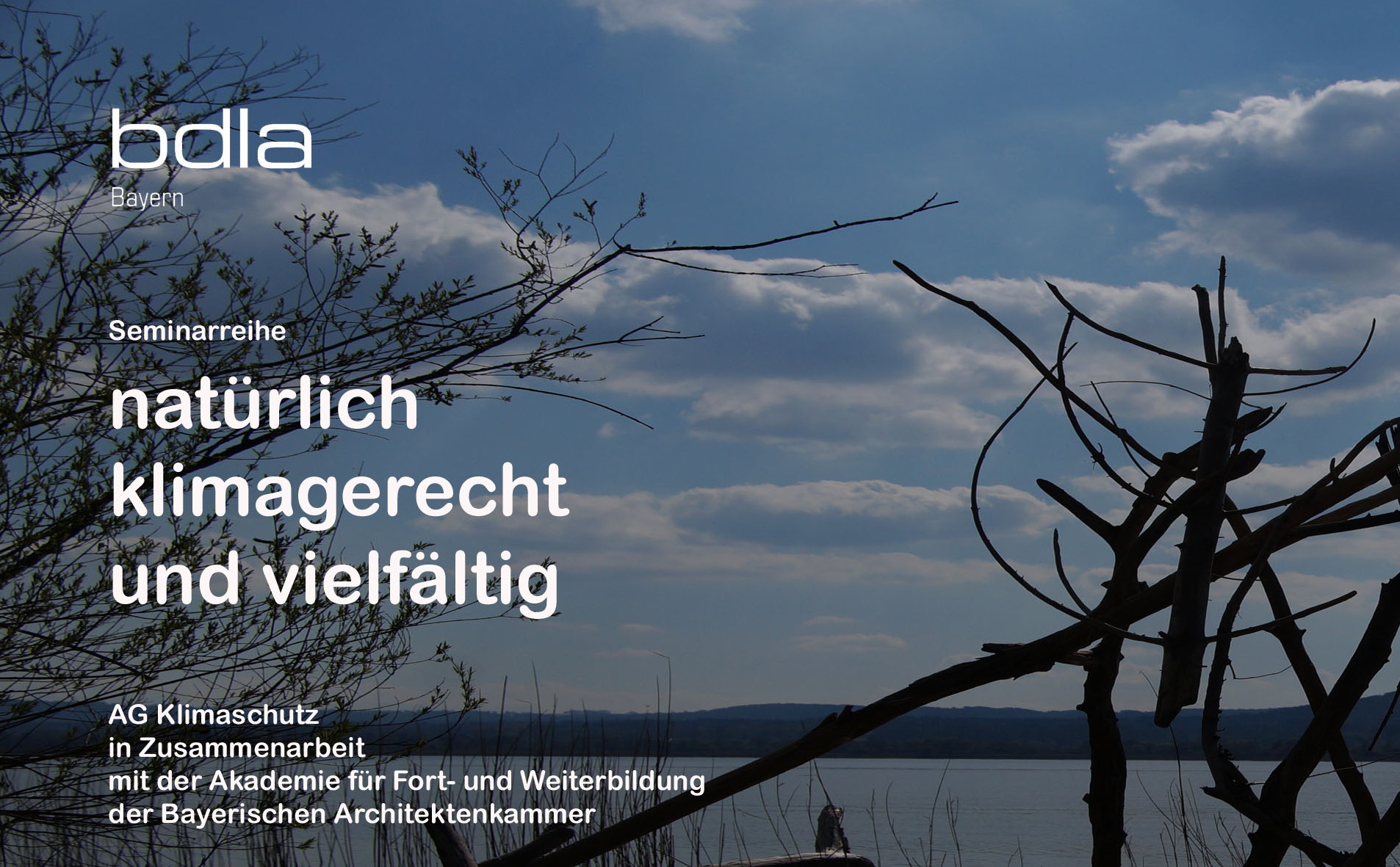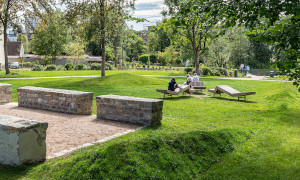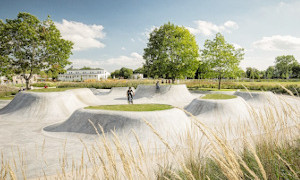In collaboration with bdla Bayern, the Bavarian Chamber of Architects has designed a 5-part, digital after-work training series that runs through October 26, 2023.

The seminar series "Naturally climate-friendly and diverse" conveys the interrelationships of construction with climate change and species loss and shows how the approaches, construction processes and structural implementations can succeed in a sustainable manner.
"Motor" of the series is on the part of the bdla Bavaria the AG climatic protection, which along-conceived the meetings substantially.
Biodiversity and Species
Thursday, June 29, 2023, 6:00 p.m. - 7:30 p.m.
This talk will show how biodiversity and species diversity can be improved in an urban context. What factors condition biodiversity on a property, where is room for maneuver? How can improvements be achieved in existing buildings and new construction projects?
Topics: Typical animal species on buildings and in residential complexes | Ecological connection animal/plant | Effective and long-term safeguarding of species protection measures | Adapted lighting | Involvement of residents, etc. | Animal-Aided Design
Lecturer: Martin Hänsel, Managing Director, BUND Naturschutz Kreisgruppe München
Greeting: Dipl.-Ing. Univ. Andreas Rockinger, Landscape Architect, Munich
Participation and Social Inclusion
Tuesday, July 25, 2023, 6:00 p.m. - 7:30 p.m.
Planning expertise is undeniably a key prerequisite for forward-looking urban redevelopment, but more is needed to address current challenges such as climate and biodiversity crises. In the face of tight budgets and limited resources, social participation, involvement and co-design are needed - in summary, a whole-of-society show of strength, so that an ecological, socially sustainable and climate-just transformation can succeed.
But how can cooperation and responsible action be promoted in the face of conflicting interests and fears of change?
With a focus on public space, the seminar will shed light on how to deal with resistance and why, despite many hurdles, it is worthwhile to implement and further develop participation processes so that a transformation of our cities can be supported by many.
Topics: Reasons | Goals | Hurdles and chances of participation processes in times of climate and biodiversity crisis | Best practice | Methods of communication and conflict resolution
Lecturer: Prof. Dr. Susann Ahn, landscape architect, urban planner, mediator, Vienna/Freising; Dipl.-Ing. Univ. Andreas Rockinger, landscape architect, mediator, Munich
Greeting: Dipl.-Ing. Mechthild v. Puttkamer, landscape architect, Starnberg
Climate Sensitive Consideration of Building Materials and Construction Processes
Thursday, September 28, 2023, 6:00 p.m. - 7:30 p.m.
Construction is climate-relevant, both in terms of the choice of building materials and the construction methods and processes themselves. Even if the share of climate-damaging emissions from the construction sector in the design of open spaces with green areas and plantings is relatively small, built elements are usually also part of the landscape architectural design, such as surfacing surfaces, stairs, walls, furnishings, etc. In this respect, planners and builders in the "green" profession must pay no less attention to the climate impact of building materials and construction methods than those involved in building construction projects. Rather, each building project must be developed as a climate-relevant unit. Under the three key words reflect, recycle, and renaturalize, considerations are made and suggestions are made in this regard.
Topics: Rethinking planning and construction processes | Reflecting on design and implementation principles | Appreciating and reusing what already exists | Turning linear processes into circular ones | Returning buildings to nature
Lecturer: Dipl.-Ing. Univ. Prof. Ingrid Schegk, landscape architect, urban planner, Haimhausen
Greeting: Dipl.-Ing. (FH) Katja Aufermann, landscape architect, urban planner, Munich
Soil: livelihood and habitat
Thursday, October 05, 2023, 6:00 - 7:30 p.m.
A greater understanding and appreciation of soils is essential to solving global problems such as climate change and species loss. Soil is where the geosphere, hydrosphere, atmosphere, and biosphere intersect. Food is produced on fertile soils. Drinking water is previously purified from soil. It is as diverse in species as a rainforest. Soil is also the settlement place of man, who wants to find appealing places. The functions and potentials of soils are endangered. Traditionally, farmers and foresters are concerned with soil.
Architects and landscape architects should also struggle to find site-appropriate solutions so that soils retain their role as livelihoods and habitats. The presentation will discuss contextual conflicts and possible actions.
Topics: What is soil? | Biodiversity | Soil Protection | Soil Functions | Sealing | Land Consumption | Ecosystem Services | Soil Habitat | Soil and Water | Soil and Ecosystems in the City
Lecturer: Prof. Dr. Christian Huber, Ecological Site Science, Weihenstephan-Triesdorf University of Applied Sciences
Greeting: Dipl.-Ing. Univ. Monika Pfaffelhuber, Landscape Architect, Munich
Water-Sensitive and Heat-Adapted Residential Development
Thursday, October 26, 2023, 6:00 p.m. - 7:30 p.m.
Climate change calls for adaptation of cities and settlements. What measures are suitable are known in principle. On the other hand, measures for heat prevention during the day are poor for the situation at night and vice versa. Certain steps in climate adaptation like tree rigs or wetlands have not been introduced yet.
In the seminar, planning examples will be used to show how climate adaptation can succeed from the citywide level to the concrete project. The main levers will be shown how the sponge city principle can be implemented. A focus will be put on the public space (streets, squares). The speaker (owner of the word mark sponge city) will show how the cascading system of decoupling can be implemented (drainless streets).
Topics: Sponge City | Heat Prevention | Water Sensitive Settlement Development | Debris Free Streets | BlueGreen Streets | Stormwater as a Resource.
Lecturer: Dr. Carlo W. Becker, landscape architect, bgmr Landschaftsarchitekten GmbH, Berlin
Greeting: Dipl.-Ing. (FH) Katja Aufermann, landscape architect, urban planner, Munich
- Latitude: 0
- Longitude: 0
Landscape Architecture
Announcements
Association


